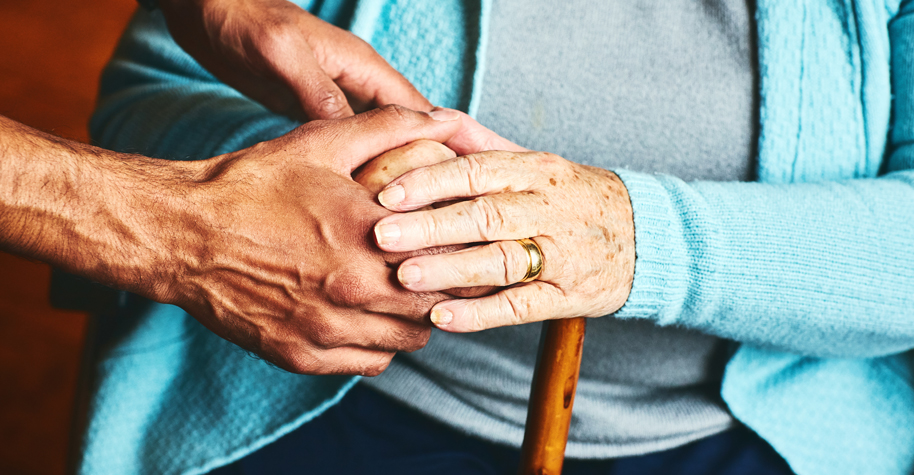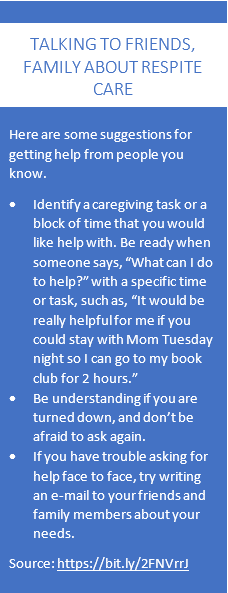Take Care: Prep Your Health Tips for Caregivers
Posted on by
November is National Family Caregivers Month when we celebrate the various and dedicated caregivers in our lives.
Caregiving is an important public health issue that affects the quality of life for millions of individuals. Informal or unpaid caregivers (family members or friends) are the backbone of long-term care provided in people’s homes. While some aspects of caregiving may be rewarding, caregivers can also be at increased risk for negative health consequences. These may include stress, depression, difficulty maintaining a healthy lifestyle, and staying up to date on their own medical appointments.(1)
Emergencies can happen unexpectedly and create more stress for a caregiver. Having supplies set aside and a plan in place can help caregivers cope with disaster-related stress, allowing them to focus more on the health and safety of the person they are caring for.
Caregiver Preparedness & Planning
There are many ways caregivers can prepare themselves and the person they are caring for before an emergency arises. They include stocking up on emergency supplies, learning practical caregiving skills, having a plan, and staying informed.
Care Packages
Family caregivers should talk to the healthcare provider of the person they care for to identify essential supplies that are important to stock up on before an emergency. In addition to food, water, and prescription medications, other personal needs(2) might include:
- Incontinence undergarments, wipes, and lotions
- A cooler or insulated bag to keep medications cold
- A current list of medications and dosage details
- Copies of important paperwork
- Recent photos of the person
- Warm clothing and sturdy shoes
- Medical equipment and devices, including eyeglasses, hearing aids, and hearing aid batteries
For more information on how to prepare for emergencies, visit the Prepare Your Health website.
Learn Practical Caregiving Skills
Caregivers provide care to people who need some degree of ongoing assistance with everyday tasks on a regular or daily basis. For some caregivers that may include helping with bathing and dressing, paying bills, shopping, and providing transportation. It can also involve emotional support and help with managing a chronic disease or disability.
According to a report from the Home Alone Alliance, many caregivers also manage medications, help with mobility devices, prepare special diets, dress wounds, and perform other tasks typically done by healthcare professionals.(3)
Most people assume that caregivers know how to do all these things, but the truth is most don’t. While caregivers might receive some instruction at discharge, most said they needed more training.(2) It is important that caregivers work with doctors to learn how to safely perform tasks that may need to be done at home if medical services are unavailable because of an emergency.
Develop a Care Plan
A care plan is a document that summarizes a person’s health conditions and current treatments for their care. A plan should include information about the person’s health conditions, medications and healthcare providers, emergency contacts, and a list of caregiver resources.
Caregivers should ask the healthcare provider of the person they care for to help complete the care plan and—at the same time—discuss with them advanced care plan options and resources that are available to help make things easier for you as a caregiver.
It is important that everyone involved in caregiving for a person is familiar with the details of the care plan and the Emergency Action Plan. An Emergency Action Plan should identify where to go with the person receiving care, what supplies to take, what evacuation routes to follow, and who will take them. Caregivers should learn more about emergency plans and register for evacuation assistance programs in the care recipient’s area.
Caregivers should update the plans every year or as the health of or medications prescribed to the person they care for change.
Respite & Self-Care for Caregivers
Although caregiving can be fulfilling, it can also affect caregivers in different ways. Caregivers can experience physical and mental strain from the stress of keeping up with their responsibilities. They can have problems sleeping and changes in appetite; feel anxious, depressed, and lonely; and experience other health problems. Over half (53%) of caregivers indicate that a decline in their health compromises their ability to provide care.(1) Caregivers of people with dementia or Alzheimer’s are particularly at greater risk for anxiety, depression, and lower quality of life compared to caregivers of people with other chronic conditions.
Respite and self-care are two ways of caring for yourself when caring for another.
Respite Care
To be a good caregiver, caregivers need to take care of themselves and learn healthy ways to deal with stressful situations, such as emergencies. One way they can do that is to make sure they take consistent breaks from caregiving responsibilities. This is called a respite.
Respite care allows the caregiver some time off from their caregiving responsibilities. Short breaks can be a key part of maintaining your own health. Research shows that even a few hours of respite a week can improve a caregiver’s well-being.(4)
Self-Care
Self-care isn’t selfish; it’s necessary if you are a caregiver. It’s important that caregivers take care of their physical, mental, and emotional health. Here are some ways that caregivers can better take care of others by first taking care of themselves.
- Find a support group in your community that you can rely on when you start to feel overwhelmed. If you’re not able to leave your loved one at home but need emotional support, an online support group might be a good option. Be careful not to give out detailed personal, medical, or financial information to anyone online to protect against fraud or scams.
- Speak with a doctor if you feel anxious or depressed during these tough times. It is okay to ask for help. Go to yearly doctor appointments if you can and stay on top of yearly vaccinations to stay healthy.
- Eat healthily, stay active, and get enough rest. About half of caregivers don’t get enough restful, continuous sleep, making them feel tired and leading to poor quality of life.
During times like the present, caregivers need more support than ever. Having to social distance with family and friends and worrying about exposing the individual they are caring for to COVID-19 can cause more stress. It is important to lean on each other in different ways by staying connected and knowing that our communities have many resources available to each of us during tough times.
References
- https://www.cdc.gov/aging/caregiving/index.htm
- https://www.nia.nih.gov/health/disaster-preparedness-alzheimers-caregivers
- https://healthjournalism.org/blog/2019/07/report-caregivers-tackling-complex-medical-tasks-with-little-training/
- https://www.cdc.gov/aging/publications/features/caring-for-yourself.html
Resources
- CDC Caregiving
- CDC Cancer Caregivers: Caring for Yourself
- Older Adults and Disaster
- CDC Caring for Yourself When Caring for Another
- Caregiver Action Network
- COVID-19 Guidance for Caregivers
- Stress and Coping
Thanks in advance for your questions and comments on this Public Health Matters post. Please note that the CDC does not give personal medical advice. If you are concerned you have a disease or condition, talk to your doctor.
Have a question for CDC? CDC-INFO (http://www.cdc.gov/cdc-info/index.html) offers live agents by phone and email to help you find the latest, reliable, and science-based health information on more than 750 health topics.
3 comments on “Take Care: Prep Your Health Tips for Caregivers”
Comments listed below are posted by individuals not associated with CDC, unless otherwise stated. These comments do not represent the official views of CDC, and CDC does not guarantee that any information posted by individuals on this site is correct, and disclaims any liability for any loss or damage resulting from reliance on any such information. Read more about our comment policy ».


Being a caregiver can be a difficult task. From nurses to family caring for others at home, we tend to forget about ourselves. Ensuring that caregivers have the appropriate essentials needed to provide care is important and ensuring that a caregiver is taking care of themselves is just as important. Taking breaks when needed, even in the busiest moments is essential. Utilizing resources such as respite care in the case of caregivers within the home is something that is taken for granted. We all need a break sometimes. If we don’t care for ourselves, how are we supposed to provide care for others?
I am a nurse working at a local hospital in Virginia. While providing care for my patients I am able to gain some small insight into their circumstances and I often see that they depend on the help from family members or other caregivers. The responsibilities that a caregiver is burdened with are often overwhelming and sometimes these individuals are confronted with choices that have to be made suddenly and without sufficient time to create a plan. Nurses have the opportunity to assist by providing education and sharing resources. When the health of a family member declines suddenly and there is a new need for an increased level of care, we can use our nursing judgment to assess how appropriate the current living situation is. Working together with other healthcare disciplinaries, such as social workers, we can help during this challenging time. Caregiver strain is very common, especially when the patient needs more care than can be provided by just one person. As a nurse I try to be a resource for my patients and their caregivers every day, and I am grateful for having this opportunity to make a little change.
From a nurse’s perspective caring for others is a task that requires compassion and strength. Caring for others can take a lot out of a person physically, mentally, and financially. To provide quality care to others you must care for yourself and take time for yourself to ensure your own health. As nurses we can offer encouragement to caregivers to practice self-care measures. Connecting caregivers with resources that can help guide them where to turn when they need a break, need someone to talk to, need supplies, guidance on how to care for others, or care for themselves. I feel that as nurses we can ensure the caregivers that they are doing a good job and that it is ok to ask for help when needed. The caregiver needs to know their health and wellbeing is important, you can’t care for others if you don’t take care of yourself.